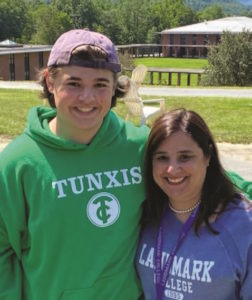Learning How to Learn: The Magic of a Summer Program
Attention Magazine February 2023
 Thirty years ago, just after being diagnosed with ADD at age twenty-one, I stood in the doorway of my dorm at Landmark College saying goodbye to my mother. I was terrified. I had come very close to failing out of Ohio State and knew that if this didn’t work, I would probably never finish college. I had struggled in school academically, never understanding why I felt smart but could not succeed when it came to my grades. There I stood, on the precipice of what? I didn’t even know what academic success felt like.
Thirty years ago, just after being diagnosed with ADD at age twenty-one, I stood in the doorway of my dorm at Landmark College saying goodbye to my mother. I was terrified. I had come very close to failing out of Ohio State and knew that if this didn’t work, I would probably never finish college. I had struggled in school academically, never understanding why I felt smart but could not succeed when it came to my grades. There I stood, on the precipice of what? I didn’t even know what academic success felt like.
From day one, I felt a seismic shift underway. With small classes, supportive teachers, the camaraderie of peers who had experienced the frustration in school I had, and, most importantly, study skills and executive function strategies wound into every course, the changes were immediate. I soaked up every method suggested. I learned to take notes, to organize, to color code, to annotate, to attend every class, to advocate for myself. I learned how to learn. It was as though a cloud were lifted. I became a student. A real student.
I went on to get a bachelor of arts degree from the University of Vermont, a master’s degree in elementary education from Fordham, and a master’s degree in library science from SUNY Buffalo. I am awaiting decisions on doctoral programs. Do I need this much education? Probably not. But how do you stop learning once you know how? It is a thirst that cannot be quenched.
I now have two children, ages nineteen and twenty, and I watched them carefully as they went through school, terrified they would fall through the cracks as I had for so many years. It wasn’t until we were all home during the COVID-19 lockdowns, however, that I noticed that my son, Andrew, a high school student, was getting grades just like mine had been. If Andrew liked a class, he got something like a 98%. If he didn’t like a class, he might pass, but most likely would end up with something like a 60%. I realized he might have ADHD. After an evaluation, Andrew was quickly diagnosed. Sitting at dinner one night, I said to him, “Would you consider going to a Landmark summer program?” He didn’t hesitate to say yes. I was shocked. Most teenage kids are reluctant to step out of their comfort zone.
Andrew loved his summer program. He is a very typical teenage boy. He has friends, played high school soccer, plays video games, and loves the freedom of having his driver’s license. I did not expect the level of enthusiasm that emanated from him when he talked about the program. He learned to make lists of assignments due. He learned to color code and to make sure to attend every class. He learned to advocate for himself. This all took place while he navigated living in a dorm setting with a roommate on a college campus for the first time in his life. He made wonderful friends, and he loved the feeling of acceptance he and his peers had for one another as they openly discussed past academic experiences.
Wondering what would stick, I watched Andrew during his senior year in high school. To my relief, what he learned during the summer came home with him. I saw the lists on his desk of what assignments were due when. He asked me for money to buy highlighters and folders to color code. He reached out to teachers when he wanted clarification on assignments. He became a student. He applied to college with confidence, and we celebrated when he was accepted early to his first choice, Dickinson College in Carlisle, Pennsylvania. He is about to complete his first semester, and he sends me pictures of his grades. He is thriving.
Andrew said that he loved the positive attitudes he experienced during his summer program. He felt the teachers wanted him to succeed and that they took time to get to know their students’ learning styles, differentiating their instruction to ensure student needs are met.
So, what was the magic?
It isn’t magic. It is gifted teachers teaching gifted students. But, it is magic, because it was transformative for Andrew as it has been for so many others.


Elizabeth Lavine Russell, right, and son Andrew


